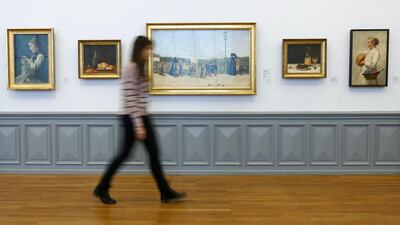A new law in the US state of New York obligates museums to disclose whether a piece of artwork was stolen by the Nazis during the Second World War.
The new law, passed earlier this month, mandates that museums “prominently place a placard or other signage” aside the artwork, CNN reported.
The Third Reich stole and confiscated about 600,000 works of art during the war, mostly from Jewish communities.
The legislation is part of a package signed by New York Governor Kathy Hochul that aims to better honour and support Holocaust survivors.
“As New Yorkers, we are united in our solemn commitment to Holocaust survivors: we will never forget,” Ms Hochul said in a statement.
“These are individuals who have endured unspeakable tragedy but nonetheless have persevered to build lives of meaning and purpose right here in New York.
“We owe it to them, their families and the six million Jews who perished in the Holocaust to honour their memories and ensure future generations understand the horrors of this era.”
Holocaust Remembrance Day — in pictures
In 1998, 44 countries signed the Washington Principles, a set of international guidelines for returning Nazi-looted art. Since then, countries such Austria and Germany have returned tens of thousands of stolen items, Smithsonian Magazine reported.
But thousands of paintings, sculptures and other pieces of stolen art are currently held by museums around the world as the original owners have either died, have yet to claim them or are working through the extensive legal process of retrieving them.
For example, according to Smithsonian Magazine, the Louvre in Paris, as of 2018, held more than 1,700 works looted by the Nazis.
“For years, many of these paintings have been on display at institutions, yet without any acknowledgement of their origin,” Jack Kliger, chief executive at the Museum of Jewish Heritage in New York City, told CNN.
“This legislation remedies that and allows institutions in New York to honour those whose lives were lost and whose personal possessions were stolen for profit.”

















